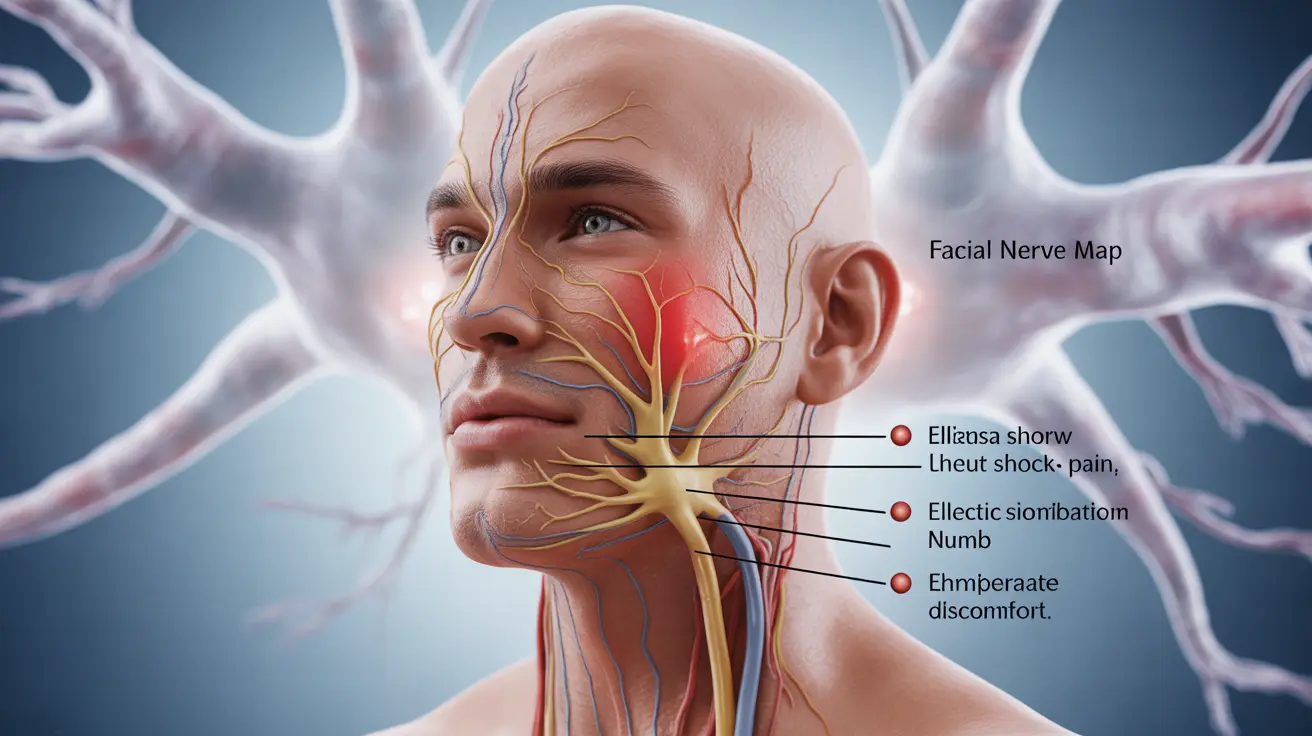Temporomandibular joint (TMJ) disorder can sometimes lead to nerve damage, causing distinct and often concerning symptoms that extend beyond typical jaw discomfort. Understanding these symptoms is crucial for early detection and proper treatment, as nerve involvement can significantly impact daily activities like eating, speaking, and facial expressions.
This comprehensive guide explores the key indicators of TMJ-related nerve damage, helping you distinguish between regular TMJ pain and nerve-specific symptoms, while outlining available treatment options and important warning signs that warrant medical attention.
Recognizing TMJ Nerve Damage Symptoms
TMJ nerve damage often presents with unique symptoms that differ from standard TMJ disorder signs. Common indicators include:
- Sharp, electric shock-like sensations in the face
- Numbness or tingling in the jaw, face, or temple area
- Burning sensations along nerve pathways
- Sudden, intense shooting pain
- Reduced sensation in parts of the face
- Muscle weakness on one side of the face
Distinguishing Nerve Pain from Regular TMJ Symptoms
While regular TMJ disorder typically causes mechanical pain and discomfort, nerve damage symptoms have distinct characteristics:
Traditional TMJ Symptoms
- Jaw clicking or popping
- Difficulty opening the mouth
- General aching in the jaw joint
- Muscle tension
Nerve Damage Indicators
- Electric shock sensations
- Radiating pain patterns
- Persistent numbness or tingling
- Altered facial sensation
- Potential muscle weakness
Treatment Approaches for TMJ Nerve Pain
Managing TMJ nerve damage requires a comprehensive treatment strategy that may include:
Medical Interventions
- Nerve block injections
- Anti-inflammatory medications
- Anticonvulsant medications for nerve pain
- Physical therapy
- Specialized TMJ splints
Alternative Therapies
- Acupuncture
- Gentle massage therapy
- Heat and cold therapy
- Ultrasound treatment
- Low-level laser therapy
Warning Signs: When to Seek Medical Care
Certain symptoms require immediate medical attention:
- Sudden onset of facial numbness
- Severe, unrelenting pain
- Progressive muscle weakness
- Difficulty with facial expressions
- Changes in speech or swallowing
- Persistent headaches with neurological symptoms
Lifestyle Modifications and Self-Care
Several lifestyle changes can help manage TMJ nerve damage symptoms:
- Maintaining proper posture
- Practicing stress reduction techniques
- Following a soft food diet
- Avoiding extreme jaw movements
- Performing gentle jaw exercises as recommended
- Getting adequate rest and sleep
Frequently Asked Questions
What are the common nerve damage symptoms caused by TMJ disorder?
Common symptoms include electric shock-like pain, numbness or tingling in the face, burning sensations, reduced facial sensation, and potential muscle weakness. These symptoms often differ from typical TMJ pain and may affect various parts of the face and jaw area.
How can TMJ nerve damage be distinguished from regular TMJ pain or other facial nerve issues?
TMJ nerve damage typically presents with electric shock-like sensations, numbness, and tingling, while regular TMJ pain usually involves mechanical symptoms like clicking, popping, and general aching. Nerve damage symptoms often follow specific nerve pathways and may include sensory changes.
What treatments are available to relieve nerve pain and muscle spasms from TMJ nerve damage?
Treatment options include nerve block injections, medication (anti-inflammatories and anticonvulsants), physical therapy, specialized splints, and alternative therapies like acupuncture and low-level laser therapy. A comprehensive treatment plan often combines multiple approaches for optimal results.
When should I see a doctor if I suspect TMJ nerve damage symptoms like numbness or electric shock pain?
Seek immediate medical attention if you experience sudden facial numbness, severe unrelenting pain, progressive muscle weakness, changes in speech or swallowing, or persistent headaches with neurological symptoms. Early intervention can prevent potential complications.
Can lifestyle changes or exercises help reduce symptoms related to TMJ nerve damage?
Yes, lifestyle modifications can help manage symptoms. These include maintaining good posture, practicing stress reduction techniques, following a soft food diet, avoiding extreme jaw movements, and performing prescribed gentle exercises. However, these should be done under professional guidance to avoid aggravating the condition.




